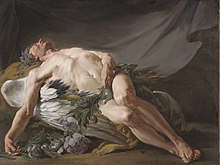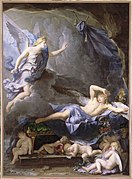Morpheus

Morpheus (/ˈmɔːrfiəs/ or /ˈmɔːrfjuːs/) is a Greek god of dreams who appears in Ovid's Metamorphoses.[1]
Mythology
The Roman poet Ovid states in his Metamorphoses that Morpheus is a son of Hypnos and reports that he had a thousand siblings, with Morpheus, Phobetor and Phantasos being merely the most prominent among them.[2] Robert Burton, in his 1621 Anatomy of Melancholy, refers to Classical depictions of Morpheus, saying "Philostaratus paints [Morpheus] in a white and black coat, with a horn and ivory box full of dreams, of the same colours, to signify good and bad".[3] Starting in the medieval period, the name Morpheus began to stand generally for the god of dreams or of sleep.[4] In Carl Michael Bellman's Fredman's Epistle No. 72, "Glimmande nymf", Morpheus is invoked as the god of sleep.[5]
Gallery
-
Aurora wakes Morpheus by Bartolomeo Altomonte (1769)
-
Morpheus and Iris, by Pierre-Narcisse Guérin, 1811 Hermitage Museum
-
Morpheus awakening as Iris draws near by René-Antoine Houasse (1690)
-
Fresco in the gallery of the Palazzo Medici-Riccardi in Florence: Charon's boat, the sleep of Night and Morpheus by Luca Giordano (1684–1686)
-
Evening or Morpheus by Charles Le Brun
-
Morpheus appears to Alcyone. Engraving by Virgil Solis for Ovid's Metamorphoses Book XI, 650–749.
-
Morpheus appears to Alcyone. Engraving (or etching more likely) by Bauer for Ovid's Metamorphoses Book XI, 633–676.
Derivation
- Friedrich Sertürner derived the name of the opiate drug morphine from the name of Morpheus.
See also
References
- ^ Ovid, Metamorphoses 11.633 ff.
- ^ Ovid (1836) p. 54
- ^ Burton (2001) (Pr. 2, Sec. 2)
- ^ Kearns (1996)
- ^ Britten Austin, Paul. The Life and Songs of Carl Michael Bellman: Genius of the Swedish Rococo. Allhem, Malmö American-Scandinavian Foundation, New York, 1967, pages 87–88. ISBN 978-3-932759-00-0
Bibliography
- Burton, Robert. (2001), The Anatomy of Melancholy., New York, ISBN 9780940322660
{{citation}}: Unknown parameter|editors=ignored (|editor=suggested) (help)CS1 maint: location missing publisher (link). - Griffin, A. H. F. (1997), A Commentary on Ovid, Metamorphoses XI, Hermathena, vol. 162/163, Dublin, JSTOR 23041237
{{citation}}: CS1 maint: location missing publisher (link). - Kearns, E. (1996), "Morpheus", Oxford Classical Dictionary (3rd rev. ed.), Oxford, ISBN 9780198661726
{{citation}}: Unknown parameter|editors=ignored (|editor=suggested) (help)CS1 maint: location missing publisher (link). - Ovid, Metamorphoses, Brookes More. Boston. Cornhill Publishing Co. 1922. Online version at the Perseus Digital Library.







